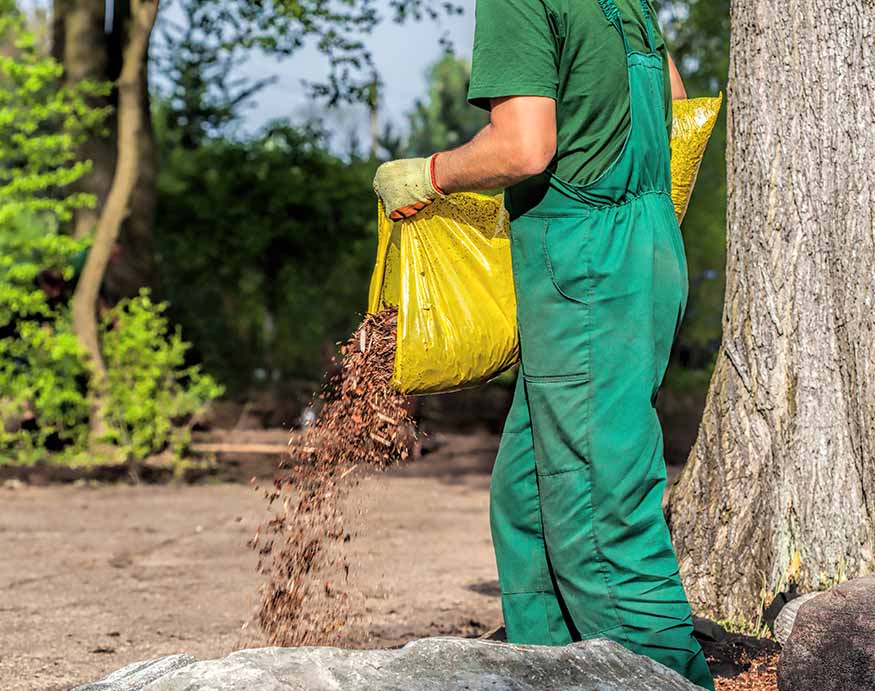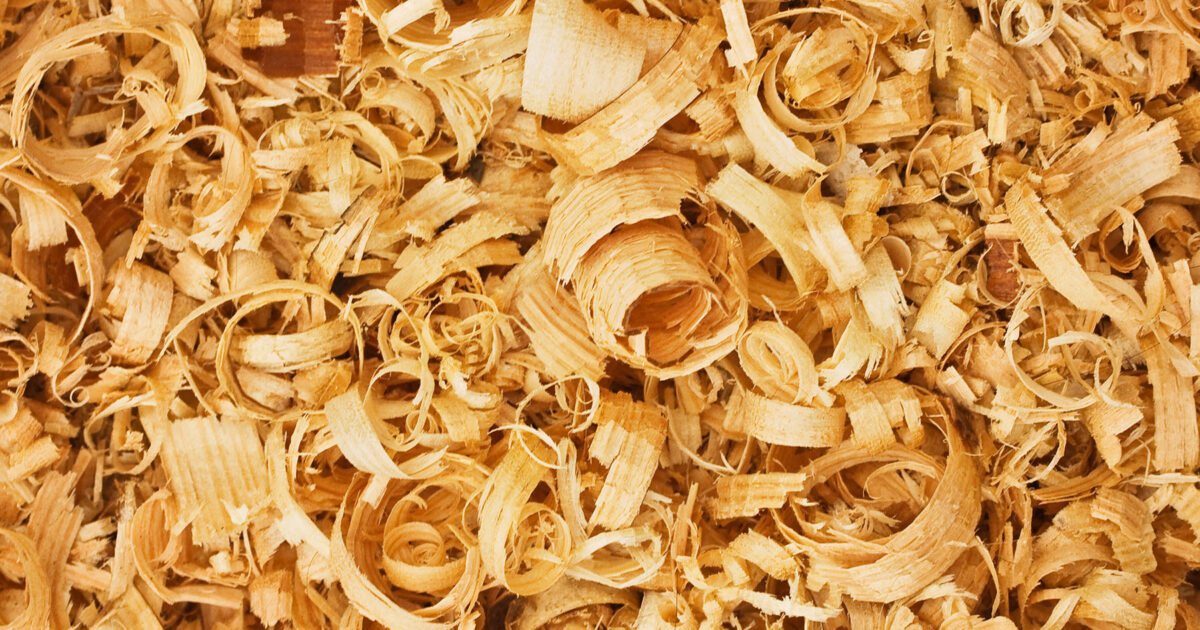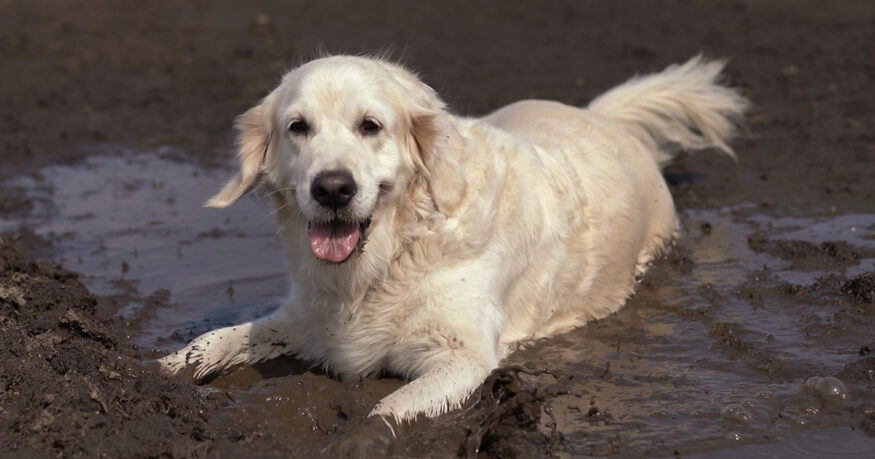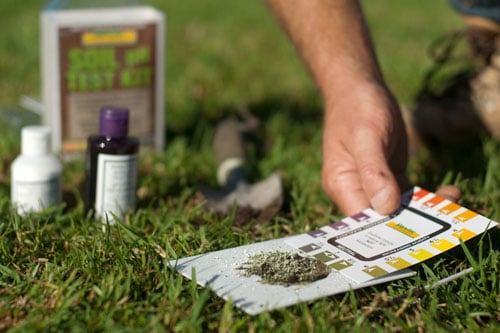Dealing with a muddy yard can be a source of frustration, particularly after heavy rain or due to poor drainage that leaves your outdoor space soggy and uninviting.
It’s a challenge many homeowners face, thwarting outdoor activities and leading to unwanted mud tracked indoors. But there’s a natural remedy that’s gaining popularity for its simplicity and effectiveness: pine flakes.
These small pieces of pine wood (sometimes called pine shavings) can be spread across the topsoil, offering a quick fix by absorbing excess moisture and improving the condition of muddy areas. Not only do pine flakes help dry up your yard by soaking up water, but they also blend into the natural environment and provide an organic material that can benefit the soil in the long run.
Key Takeaways
- Pine flakes are a natural option to address the common problem of muddy yards.
- These wood shavings absorb excess moisture quickly, helping to dry out the soil.
- Pine flakes offer benefits to soil health while managing mud effectively.
How To Use Pine Flakes To Cover Muddy Areas Of Your Yard

Here’s a basic step-by-step guide on how to lay pine flakes over muddy areas:
Collect Pine Flakes
Purchase enough pine flakes for the area you want to cover.
To find out how much volume of pine flakes you need, multiply the area’s square footage by the desired thickness in feet (2 inches is about 0.17 feet).
For example, if your area is 10 feet by 10 feet, the area is 100 square feet.
For a 2-inch thick layer, the calculation would be: 100 square feet x 0.17 feet = 17 cubic feet.
Prepare the Muddy Area
Before applying the pine flakes, it’s good practice to clear the area of any large debris or standing water.
Apply Pine Flakes
Spread the pine flakes evenly over the muddy area. Ensure that the flakes are distributed consistently across the entire area.
Level the Flakes
Once spread, level the pine flakes to ensure a uniform thickness across the area. This will help in absorbing moisture evenly.
Determine the Thickness
For most applications, a layer of about two inches of pine flakes is recommended. This thickness is sufficient to absorb excess moisture and provide a barrier against further muddiness.
Be cautious not to apply the flakes too thickly, as a very thick layer might prevent the underlying soil and plant roots from accessing necessary nutrients and air.
Monitor and Maintain
After application, monitor the area. Pine flakes will absorb moisture and integrate with the soil, creating a firm ground cover.
Over time, the flakes will decompose and may need to be replenished or removed, depending on your long-term plans for the area.
Post-Treatment Considerations: If you plan to regrow grass or other plants in the treated area, remember to remove the pine flakes and restore the soil. You may need to add new topsoil and reseed the area to encourage grass growth.
Repeat as Necessary: In areas of persistent muddiness, you may need to reapply pine flakes periodically to maintain dry conditions.
Using pine flakes is a temporary solution. For a long-term fix, consider addressing the underlying drainage issues causing the muddiness. This may involve regrading the area, installing drainage systems, or altering the landscape to improve water flow and absorption.
What Are Pine Flakes and How Do They Help With a Muddy Yard?

Pine flakes are small, chipped pieces of pine wood. They are an organic material that is highly absorbent. When you sprinkle them over your muddy yard, they act like a sponge, soaking up excess water and moisture.
This is particularly helpful in a yard that has turned muddy due to poor drainage or heavy rainfall.
Due to their coarse texture, pine flakes help improve your yard’s soil structure. They create air spaces within the soil, which allows for better water infiltration and aeration. This can prevent your grass from suffocating and reduce the risk of root diseases.
Here’s how pine flakes can benefit your yard:
- Absorption: Pine flakes absorb water, which can reduce the muddiness of your yard.
- Soil Health: By improving drainage and reducing compaction, they can enhance overall soil condition.
- Organic: As a natural material, pine flakes decompose over time, adding nutrients back into the soil.
Where To Buy Pine Flakes
Pine flakes or pine shavings are available from farm supply stores, home improvement and garden centers and on Amazon.
Benefits of Using Pine Flakes in a Muddy Yard

Pine flakes offer a natural and effective solution for managing muddy yards, with several advantages from absorbency to erosion control.
Absorbency
Pine flakes are highly absorbent, making them ideal for soaking up excess moisture in your yard.
Their ability to quickly absorb water helps to dry out muddy areas, which can be particularly beneficial during wet seasons or after heavy rainfall.
Cleaner Outdoor Area
Using pine flakes as ground cover over a muddy yard can lead to a cleaner outdoor space.
They reduce the amount of mud that gets tracked indoors and provide a more stable surface to walk on, which protects your floors and keeps your home cleaner.
Soil Structure Improvement
Pine flakes, when used as a mulch, can contribute to improving the structure of compacted soil.
By adding organic material to the soil surface, they promote better soil aeration and water infiltration, which is crucial for healthy plant growth and a robust lawn.
Erosion Control
Erosion can be a significant problem on sloped surfaces, but spreading pine flakes can help stabilize the soil surface and prevent soil loss.
They provide an extra layer of protection against the erosive forces of rain and wind.
Longevity
As a long-term solution for a muddy yard, pine flakes are durable and decompose slowly.
They do not need to be replaced as often as other short-term fixes, making them a more permanent approach to managing mud and maintaining a healthy yard.
Prevents Weeds
Pine flakes also double as a weed prevention strategy. When applied thickly, they can suppress weed growth by blocking sunlight and creating a physical barrier, reducing the amount of weeding you’ll have to do in your garden and around your lawn.
Downside of Pine Flakes
While pine flakes can be an effective way to manage a muddy yard, there are some concerns that you may need to consider before using them extensively in your landscape.
Soil Acidity
Using pine flakes in your yard might lead to a change in soil acidity over time.
This shift can make the soil less suitable for some plants that prefer neutral or alkaline conditions. Monitoring soil pH levels with regular testing may become necessary to maintain a balanced environment for your plants.
Pest Attraction
Pine flakes can potentially be inviting to specific pests such as termites and carpenter ants.
These pests are attracted to wood-based materials and could create problems in your yard or even pose a risk to nearby wooden structures.
Allergies
Allergic reactions are another point of concern with pine flakes. If you or your pets are sensitive to pine, the presence of pine flakes could trigger allergies due to the scent or direct contact.
Maintenance
Maintenance efforts might increase with the use of pine flakes. They tend to decompose or get scattered over time, requiring you to add more to maintain the yard’s condition.
This repeated leveling and replenishing could add to your regular yard work.
Considerations When Using Pine Flakes

Understanding their impact on your environment is crucial when incorporating pine flakes into your yard. These wood particles can shift the pH balance of the soil, potentially impacting sensitive plants.
If you’re implementing a rain garden or a specialized landscape design, test the soil and plan accordingly.
For those with furry companions, consider your pet’s reaction to the pine aroma. Some animals might find it unpleasant or have allergies. Keep an eye out for any changes in your pets’ behavior.
Drainage is another key aspect. While pine flakes can help with a wet yard, they shouldn’t replace a proper drainage system. Use them as a temporary measure for water absorption and tread lightly if your soil type isn’t porous.
Lastly, pine flakes may contribute to the blockage if your gutters are prone to accumulating debris. Regular maintenance of your home’s water runoff channels can prevent potential overflow, guiding rainwater into designated areas.
Here’s a quick reference to help you weigh the decision:
| Aspect | Consideration |
|---|---|
| Soil pH | Test and adjust for plant well-being |
| Pets | Monitor for any discomfort due to scent |
| Rain Garden Compatibility | Asses the impact on designed water absorption areas |
| Drainage | Integrate flakes without hindering existing systems |
| Gutter Maintenance | Clear debris that may accumulate with flake usage |
Remember: Use pine flakes as part of a thought-out strategy aligned with your gardening needs.
Alternatives to Pine Flakes
While pine flakes are a fine choice for managing soggy yards, you have several other friendly options to consider. Each alternative caters to different conditions and preferences.
Artificial Turf: Depending on the size of the area to be covered, and of course, the budget available, then artificial grass designed specifically for dog parks is a good option. The grass is designed to let urine pass through so that it does not puddle.
Sand: A popular approach for waterlogged soil is to integrate sand into the yard. Sand improves drainage by breaking up the soil, allowing water to filter through more efficiently.
Straw and Hay: These organic materials are not only affordable but also easy to apply. Lay them over muddy areas to provide a temporary barrier against moisture.
Mulch and Shavings: Much like pine flakes, these wood products help absorb excess water. You can choose from a variety of mulches or finer wood shavings, depending on your yard’s needs.
Gravel or Crushed Limestone: These stones are perfect for creating pathways and improving poor elevation in your yard. They facilitate better drainage, especially in areas where you might frequently walk.
Drainage Solutions: Installing a French drain, ditch, or drainage pipes can offer a long-term fix. These methods effectively redirect water away from problem areas.
Landscape Design: Adjusting the overall landscape design may involve core-aerating your lawn or adding rocks and prefab pavers to enhance water flow.
Remember, considering your yard’s specific conditions and consulting with a landscape professional can yield the best results. The friendly advice is to select the method that suits both your yard and your personal style to keep your outdoor space looking good and functioning well.
Frequently Asked Questions
In this section, you’ll find answers to common concerns regarding the use of pine flakes in your muddy yard.
Which brand of pine flakes is most effective for muddy yards?
While specific brands are not mentioned in the search results, you should look for pine flakes that are highly absorbent and have a good reputation among users. The effectiveness can vary, so consider reading reviews or asking for recommendations at your local garden center.
Can pine flakes be safely used in areas where pets, such as dogs, play?
Yes, pine flakes are generally safe for use in areas where pets play. However, it’s essential to choose a brand that is free of additives and chemicals to ensure it is pet-friendly. Always double-check the product information before applying.
What steps can I take to ensure my yard dries up effectively after using pine flakes?
To enhance drainage and help your yard dry up:
- Apply the pine flakes evenly across the affected areas.
- Consider integrating additional methods to improve drainage, such as creating a slope or using a core aerator to increase soil absorption capacity.